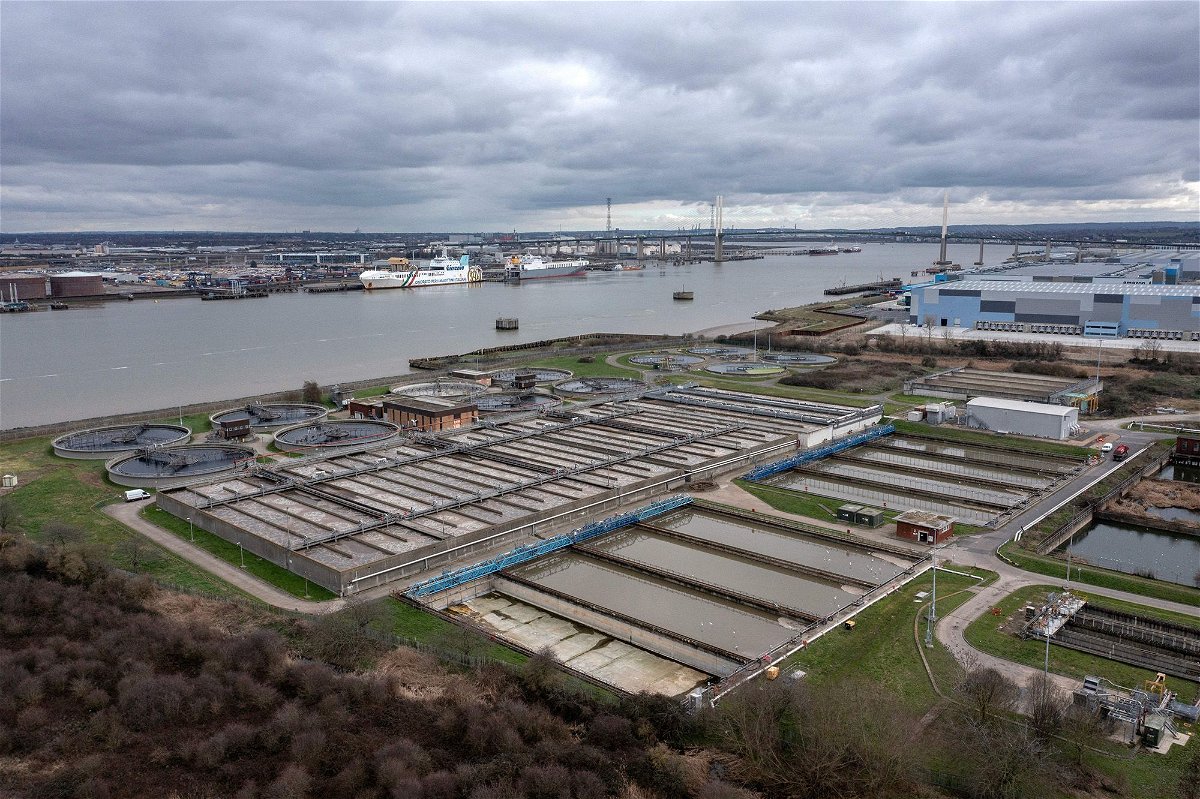The company supplying water to millions of Londoners is in deep trouble

Seen here is the Thames Water Long Reach water treatment facility in east London. Britain’s biggest water supplier said on June 28 that it needed to raise more cash from investors
By Hanna Ziady, CNN
London (CNN) — Britain’s biggest water supplier said Wednesday it needed to raise more cash from investors, as UK media reported the government was preparing contingency plans to rescue the company.
Thames Water provides drinking water and waste water services to 15 million customers in London and the southeast of England. The utility, which counts one of Canada’s largest public pension funds among its top investors, has around £14 billion ($17.5 billion) of debt on its balance sheet.
News that it needs more money came just a day after CEO Sarah Bentley resigned with immediate effect after three years in the role. She was in the second year of an eight-year turnaround plan to address aging infrastructure, tackle leakage and reduce pollution in rivers, a legacy of underinvestment.
Thames Water received £500 million ($635 million) from shareholders in March, but said Wednesday it would need more.
The firm “is continuing to work constructively with its shareholders in relation to the equity funding expected to be required to support Thames Water’s turnaround and investment plans,” it added.
The company said it was keeping the water industry regulator Ofwat “fully informed” of its progress and added that it had a “strong liquidity position,” including £4.4 billion ($5.6 billion) of cash.
Ofwat said it was in “ongoing discussions” with Thames Water “on the need for a robust and credible plan to turn the business around.”
“We will continue to focus on protecting customers’ interests,” it added.
Emergency talks
Government ministers, including representatives from the UK Treasury and the environment department, Defra, are holding emergency talks with Ofwat over Thames Water’s future, according to UK media reports.
One possibility would be to place the company into a special administration regime that effectively takes the firm into temporary public ownership. Sky News was first to report the discussions.
A government spokesperson told CNN: “This is a matter for the company and its shareholders. We prepare for a range of scenarios across our regulated industries — including water — as any responsible government would.”
The spokesperson added that the UK water sector “as a whole is financially resilient.”
Thames Water says about 24% of the water it supplies to customers is lost through leakage.
The company’s single biggest shareholder is the Ontario Municipal Employees Retirement System, which holds a stake of around 32%. The Universities Superannuation Scheme, a pension fund for the academic staff of UK universities, owns nearly 20%.
Other large investors include the Chinese and Abu Dhabi sovereign wealth funds, as well as British Columbia Investment Management Corporation, which invests on behalf of public sector workers.
Has privatization failed?
UK water companies have racked up debt of more than £60 billion ($76 billion) since being privatized three decades ago, according to Ofwat. The sector is now under pressure as interest rates rise and more income from customer bills is diverted toward servicing debt.
Water companies are also being investigated by the UK Environment Agency over the high levels of untreated sewage discharged into waterways. Last summer, several UK beaches were closed because of sewage spills, and Thames Water, along with other water companies, has been fined for failing to make enough progress in tackling the issue.
In its latest annual report, Thames Water reported nearly 8,000 sewage spills for the nine months to September 2022.
The government’s approach to regulating utilities, many of which were privatized in the 1980s and 1990s, has been thrown into relief by the company’s financial troubles, as well as by the temporary nationalization in 2021 of a major energy provider, Bulb. It was briefly run by administrators before being sold to Octopus Energy last year.
Darren Jones, a lawmaker from the opposition Labour Party who chairs parliament’s Business and Trade Committee, said energy and water companies had been allowed to serve the interests of shareholders and executives over the interests of the country and consumers.
“We’ve allowed these companies to be operated with … high levels of debt, with wealth being extracted from the companies, with investment not being high enough,” he told BBC radio Wednesday.
A 2020 report by the Public Services International Research Unit at the University of Greenwich in London found that 40% of the rise in English water bills since 1991, when most water firms were privatized, had been due to higher interest payments and increased dividends to shareholders.
Investments into UK water infrastructure required between 2025 and 2050 mean water bills will likely need to rise further, Conservative lawmaker and former Environment Secretary George Eustice told BBC radio.
The-CNN-Wire
™ & © 2023 Cable News Network, Inc., a Warner Bros. Discovery Company. All rights reserved.



